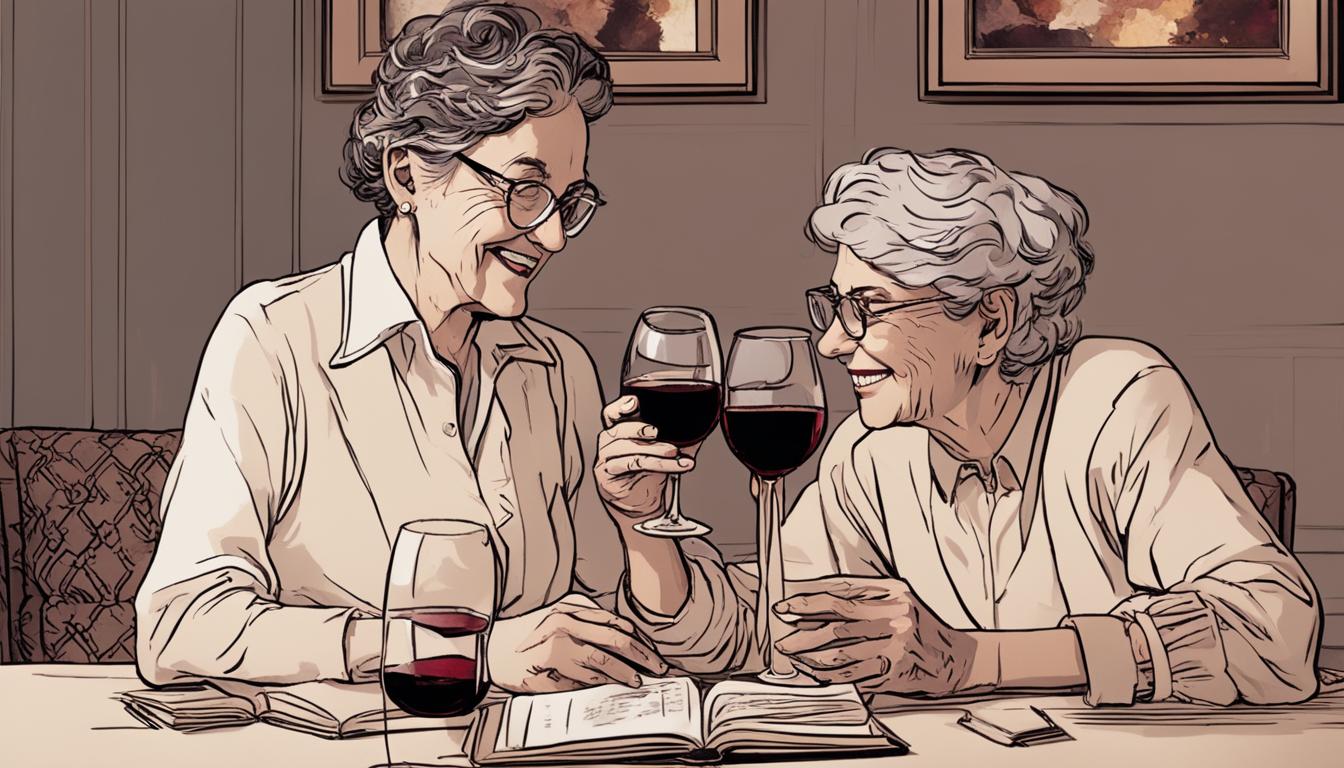Age can have a significant impact on romantic relationships, introducing both unique challenges and benefits. It’s important to remember that age should not be the sole determining factor in a relationship, as other factors like shared values and communication styles are equally crucial. Age gap relationships are not one-size-fits-all, and it’s important to dispel common misconceptions surrounding them.
Dating someone older can bring wisdom and stability to a relationship, while dating someone younger may present challenges in terms of life stages and maturity levels. Compatibility and physical intimacy can also be influenced by age. Navigating family and social expectations can be tough, but establishing boundaries and educating loved ones about age gap relationships can help.
Key Takeaways:
- Age should not be the sole determining factor in a relationship.
- Age gap relationships are not one-size-fits-all.
- Dating someone older can bring wisdom and stability.
- Dating someone younger may present challenges in terms of life stages and maturity levels.
- It is important to navigate family and social expectations by establishing boundaries and educating loved ones.
The Role of Age in Relationship Dynamics
Age differences can significantly influence the dynamics of romantic relationships. When partners have a notable age gap, they often face unique challenges and advantages stemming from generational gaps and differences in life stages. However, it’s important to note that age should not be the sole determining factor in a relationship. Other factors like shared values, communication styles, and personal compatibility also play crucial roles in fostering a strong connection.
Some couples find that age differences bring exciting layers of perspective to their relationship. These differences can provide opportunities for learning and growth, as partners share their unique experiences and insights. On the other hand, some couples may struggle to connect on certain cultural references or shared experiences, which can create challenges in understanding each other fully.
To navigate the dynamics of an age gap relationship successfully, open and honest communication is key. Partners should discuss their expectations, goals, and concerns for the relationship. This communication helps ensure that both individuals feel heard and understood. Regardless of age differences, building a foundation of trust and respect allows couples to address any differences that may arise due to generational gaps and create a healthy and fulfilling relationship.

Understanding Generational Gaps
Generational gaps can influence relationship dynamics in various ways. Partners from different generations may have distinct perspectives, values, and cultural backgrounds. This can lead to contrasting opinions and approaches towards various aspects of life, such as career goals, personal values, and family dynamics. Therefore, it becomes essential for partners to have open-mindedness and empathy to bridge these gaps and build a strong foundation for their relationship.
Common Misconceptions about Age Gap Relationships
Age gap relationships are often subject to stereotypes and misconceptions. People may assume that one partner is only interested in the relationship for financial gain, or that the relationship is inherently unequal. It is important to recognize that age gap relationships have different motivations and dynamics, and should not be generalized. Power imbalances are not necessarily tied to age differences, as many age gap relationships are based on mutual respect and equality.
One common misconception is that age gap relationships are limited to older men and younger women. In reality, age gaps can exist in same-sex couples and different gender pairings as well. Love knows no boundaries, and age should not be a limiting factor when it comes to finding happiness and connection with another person.
It is important to challenge stereotypes and preconceived notions about age gap relationships. Each relationship is unique, and should be evaluated on its own merits rather than conforming to societal expectations. Age gap relationships can thrive when there is open communication, trust, and a shared commitment to making the relationship work.
“Love knows no boundaries, and age should not be a limiting factor when it comes to finding happiness and connection with another person.”
Benefits of Dating Someone Older
When it comes to romantic relationships, dating someone older can bring a multitude of benefits. One of the key advantages is the wealth of life experience that an older partner brings to the table. Having lived through various stages of life, they can offer valuable insight and wisdom, providing guidance and support to their younger counterpart.
Furthermore, older partners often exude a sense of stability and confidence that can be highly attractive. Their life experiences have shaped them into individuals who are more secure in themselves and their goals. This can create a sense of security within the relationship, allowing for a strong foundation to be built.
In addition to the mentorship aspect, dating someone older can also foster personal and professional growth. The older partner can act as a mentor, offering advice and encouragement based on their own experiences. This can be incredibly valuable, as it provides a unique perspective and helps the younger partner navigate through various challenges they may face.
Overall, dating someone older can bring a multitude of benefits to a relationship. From the wisdom and stability they offer, to the mentorship and personal growth opportunities, having an older partner can be a rewarding experience for both individuals involved.

The Challenges of Dating Someone Younger

When it comes to age differences in relationships, dating someone younger can present its own unique set of challenges. Differences in life stages and maturity levels can sometimes create tension or misunderstandings between partners. It’s important to navigate these challenges with empathy and open communication to ensure a healthy and fulfilling relationship.
1. Difference in Life Stages: Dating someone younger means that you may be at different stages of your lives. While you might be more established in your career or have already achieved certain milestones, your partner may still be figuring out their own path. It’s essential to have patience and understanding, allowing your partner the space to grow and develop on their own timeline.
2. Maturity Levels: Maturity levels can also differ when dating someone younger. Emotional intelligence and communication skills may still be developing, which can sometimes lead to misunderstandings or conflicts. It’s vital to approach these situations with patience and empathy, taking the time to listen and understand each other’s perspectives.
Addressing the Challenges
“Building a strong foundation of trust, respect, and open communication is key in overcoming the challenges that come with dating someone younger.”
3. Open Communication: Honest and open communication is crucial in any relationship, but it becomes even more important when there is an age difference. Make sure to express your needs, expectations, and concerns openly and honestly. Encourage your partner to do the same, creating a safe space for both of you to share your thoughts and feelings.
4. Mutual Respect: Respect is the foundation of any healthy relationship. Recognize that age does not determine worth or value. Treat each other as equals, valuing each other’s perspectives and experiences. Avoid making assumptions or judgment based on age, focusing instead on the qualities and traits that drew you to each other in the first place.
5. Learning and Growing Together: Embrace the opportunity to learn and grow together as a couple. Recognize that age differences can also bring unique perspectives and insights to the relationship. Be open to new experiences, sharing your knowledge and wisdom while also being receptive to your partner’s ideas and viewpoints.
While dating someone younger can come with its own set of challenges, it’s important to remember that age should not be a barrier to love. By addressing these challenges head-on with empathy, patience, and open communication, you can build a strong and fulfilling relationship that transcends age.
Examining the Impact of Age on Compatibility
When it comes to romantic relationships, age can have a significant impact on compatibility. While compatibility depends on various factors such as personality and communication, age differences can create challenges in terms of life priorities and societal norms.
Individuals at different life stages may have different goals and responsibilities. For example, someone in their 20s may be focused on building their career and exploring new experiences, while someone in their 40s may be more established and prioritizing stability and family. These differences in life priorities can lead to tension and conflicts in the relationship, as each partner may have different expectations about the future.
Societal norms also play a role in shaping the impact of age on compatibility. Ageism, or the discrimination based on age, can affect how age gap relationships are perceived. Both partners may face judgment and scrutiny from others, which can add stress and strain to the relationship. Overcoming societal norms and educating others about the validity of age gap relationships is crucial to maintaining a healthy and fulfilling connection.
Key Points:
- Age differences can create challenges in terms of life priorities and goals.
- Societal norms and ageism can impact how age gap relationships are viewed.
- Open communication and understanding are essential for navigating the impact of age on compatibility.
Quote:
“Age differences can bring unique perspectives and experiences to a relationship, but it’s important to acknowledge and address the challenges that come with it.”
Navigating Family and Social Expectations
Age gap relationships often face challenges when it comes to navigating the expectations of family and friends. Loved ones may express concern or disapproval, adding stress to the relationship. Cultural norms and values may also impact how these relationships are viewed. It’s important to remember that age should not be the sole determining factor in a relationship, and that genuine love and connection can exist regardless of age differences.
When dealing with family expectations, open and honest communication is key. Share your feelings and intentions with your loved ones, help them understand the depth of your connection, and address any concerns they may have. Setting boundaries is crucial in navigating family dynamics, as it allows you and your partner to establish your own path and make decisions that are right for you.
Social acceptance can also play a role in the challenges faced by age gap relationships. Society often imposes expectations and judgments, making it important to build a support network of like-minded individuals who can provide understanding and encouragement. Surround yourself with people who value and respect your relationship, and seek guidance from others who have successfully navigated similar situations.
Overcoming Challenges Together
Remember, an age gap relationship is a partnership, and facing challenges together can strengthen your bond. Mutual support, understanding, and compromise are vital in overcoming family and social expectations. By educating loved ones about age gap relationships, advocating for acceptance, and focusing on the positive aspects of your partnership, you can weather the storm of external judgment and create a fulfilling and loving relationship.
“Age is just a number, and love knows no boundaries. It’s our responsibility to challenge societal norms and pave the way for acceptance and understanding in age gap relationships.”
By staying true to yourselves and each other, you can navigate the challenges of family and social expectations and build a strong foundation for a successful age gap relationship. Remember, love knows no age, and together you can create a fulfilling and lasting connection that defies stereotypes and societal judgment.
The Science behind Attraction to Different Age Groups
Attraction to different age groups is a complex phenomenon influenced by a combination of biological factors and social norms. People are often drawn to partners who differ in age, and several reasons contribute to this attraction. Biological factors such as fertility and reproductive health may play a role, as individuals may subconsciously seek partners who can support successful reproduction.
In addition to biological factors, social norms and cultural ideas about beauty and desirability also influence our attraction to different age groups. Society often values youth and associates it with physical attractiveness, while maturity and wisdom are seen as desirable traits in older individuals. These societal norms can shape our preferences and perceptions of attractiveness.
“The age gap between partners can also impact the longevity of the relationship, with larger age gaps being associated with shorter relationships.”
Research has shown that the age gap between partners can also impact the longevity of the relationship. Studies have found that relationships with significant age differences tend to have shorter durations. While this doesn’t mean that all age gap relationships are destined to fail, it does suggest that there may be additional challenges and dynamics to navigate.
Society’s views on age gap relationships can perpetuate stereotypes and contribute to ageism. It is important to challenge these stereotypes and recognize that love and attraction can transcend age. By understanding the science behind attraction to different age groups, we can promote acceptance and understanding in relationships of all kinds.
Overcoming Societal Stigma and Judgment
Society’s perception of age gap relationships can often be accompanied by stigma and judgment. However, it is important for couples in these relationships to remain resilient and stay true to their love, regardless of external pressures. By understanding and addressing societal stigma head-on, couples can overcome these challenges and embrace their unique connection.
Building self-awareness and confidence in the relationship is crucial when facing societal judgment. It’s essential for couples to recognize that their love is valid and should not be defined by age. Surrounding themselves with a supportive network of friends or joining communities that understand and accept age gap relationships can provide a much-needed sense of belonging and encouragement.
Open and honest communication is vital in overcoming societal stigma. Couples should have discussions about their relationship, including their motivations and goals, with family, friends, and loved ones. Educating them about the nature of age gap relationships can help dispel misconceptions and alleviate concerns.
Setting boundaries is also crucial. Couples should be assertive in establishing what is acceptable and what is not when it comes to discussing their relationship with others. By setting clear boundaries, they can protect their relationship from unnecessary judgment and intrusion.
By focusing on the positive aspects of their relationship, such as love, mutual respect, and shared values, couples can counteract external judgment and strengthen their bond. Remembering that love knows no age limits and that happiness can be found regardless of age differences is key to overcoming societal stigma and judgment.
Psychological Dynamics of Dating Someone Older or Younger
Age gap relationships can introduce unique psychological dynamics as partners navigate their different experiences, values, and worldviews. These dynamics can influence the power balance within the relationship and impact the overall dynamics between the couple.
One important aspect to consider is the potential for a power imbalance. When one partner is significantly older or younger, there may be inherent differences in life experiences, knowledge, and decision-making abilities. This can create a dynamic where one partner may hold more influence or control over certain aspects of the relationship. It is essential for both partners to be aware of this potential power imbalance and actively work towards maintaining a healthy level of equality and mutual respect.
Addressing the power imbalance
To address the power imbalance, open and honest communication is vital. Both partners should feel comfortable expressing their needs, desires, and concerns within the relationship. It is crucial to actively listen and validate each other’s perspectives, ensuring that both partners have an equal say in decision-making processes.
“In age gap relationships, it is important to recognize and appreciate the unique perspectives that both partners bring to the table. This can foster a sense of mutual growth and learning.”
Learning from each other’s experiences can also be a valuable aspect of age gap relationships. Partners can engage in meaningful discussions, sharing insights from their different life stages and backgrounds. This exchange of knowledge can enhance the overall understanding and connection between partners, promoting personal growth and emotional intimacy.
The psychological dynamics of dating someone older or younger require conscious effort from both partners to navigate successfully. By addressing power imbalances, fostering open communication, and embracing each other’s unique experiences, age gap relationships can thrive and bring about a deep sense of fulfillment.

Conclusion
Age gap relationships can be complex, with both benefits and challenges. While age should not be the sole determining factor in a relationship, it can impact dynamics, compatibility, and societal expectations. It is important to approach age gap relationships with open communication, understanding, and mutual respect.
Love knows no age limits, and with a willingness to address challenges and navigate family and societal expectations, couples can find happiness regardless of their age differences. Building a supportive network and setting boundaries can help overcome the societal stigma and judgment that age gap relationships may face.
Remember, compatibility in a relationship depends on various factors beyond age, such as shared values, communication styles, and overall compatibility. By focusing on these factors and maintaining open and honest communication, couples can create a strong foundation for a successful age gap relationship.
Ultimately, love should be celebrated in all its forms, and age should not hinder the pursuit of a fulfilling and meaningful relationship. So whether you find love with someone older or younger, embrace the journey and cherish the connection you have with your partner, because love truly knows no age.
FAQ
What role does age play in shaping romantic relationships?
Age can play a major role in shaping romantic relationships, with couples facing unique challenges and benefits. However, age should not be the sole determining factor in a relationship, as other factors such as shared values and communication styles are important.
What are some common misconceptions about age gap relationships?
There are common misconceptions about age gap relationships, such as assuming one partner is only interested for financial gain or that the relationship is inherently unequal. It is important to recognize that age gap relationships have different motivations and contributing factors.
What are the benefits of dating someone older?
Dating someone older can bring wisdom and stability to a relationship. Older partners often have more life experience and can offer guidance and mentorship. They may also be more confident, stable, and secure, which can be attractive qualities.
What are the challenges of dating someone younger?
Dating someone younger can present challenges in terms of differences in life stages, career goals, and maturity levels. Younger partners may still be figuring out their own identity and may not have the same level of emotional intelligence or communication skills.
How does age impact compatibility in a relationship?
Age difference is just one factor that can affect compatibility in romantic relationships. Compatibility depends on various factors such as personality, values, and communication. It is important to consider how age differences can create challenges in terms of life priorities and societal norms.
How can couples navigate family and social expectations in an age gap relationship?
Age gap relationships may face challenges when it comes to navigating the expectations of family and friends. Communicating with loved ones in a respectful and honest manner can help ease tensions and educate them about age gap relationships. Setting boundaries and seeking support from others in similar situations can also be beneficial.
What factors contribute to attraction to different age groups?
People are often attracted to partners who differ in age due to biological factors such as fertility and reproductive health, as well as social norms and ideas about beauty and desirability. The age gap between partners can also impact the longevity of the relationship.
How can individuals overcome societal stigma and judgment in age gap relationships?
Despite growing acceptance of age gap relationships, societal stigma and judgment can still create obstacles. Building self-awareness and confidence in the relationship is important to withstand external pressures. Communicating openly, setting boundaries, and focusing on the positive aspects of the relationship can also counteract external judgment.
What are the psychological dynamics of dating someone older or younger?
Age gap relationships can bring unique psychological challenges as partners navigate differences in experiences, values, and worldviews. Power imbalances and societal expectations can impact the relationship. Open communication, learning from each other’s experiences, and addressing power imbalances are crucial for a healthy age gap relationship.


